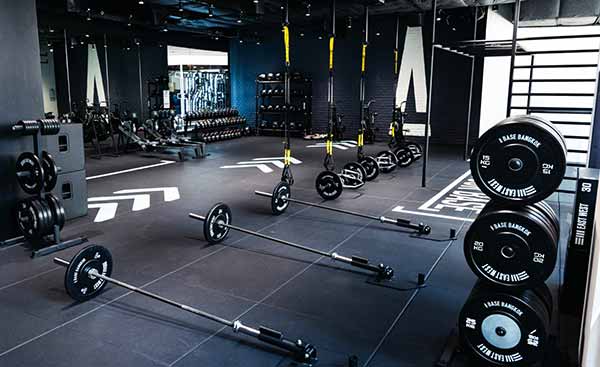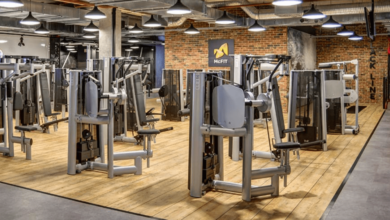The Comprehensive Benefits of the Gym: A Pathway to Total Wellness
In today’s health-conscious world, the benefits of the gym extend well beyond muscle building and weight loss.
Thank you for reading this post, don't forget to subscribe!While physical fitness remains a primary focus, regular gym attendance offers a holistic approach to health, encompassing mental, emotional, and social well-being. This article explores the diverse benefits of the gym, demonstrating how it enhances physical health, mental resilience, emotional stability, and long-term wellness.
1. Physical Benefits of the Gym: Strength, Endurance, and Flexibility
The most immediate and tangible benefits of the gym are physical, ranging from increased strength to improved flexibility.
1.1. Enhanced Muscle Strength and Definition

One of the most well-known benefits of the gym is improved muscle strength and definition. Resistance training, such as weightlifting or bodyweight exercises, promotes muscle growth (hypertrophy) and strengthens bones. This not only enhances aesthetics but also improves functional strength, helping with daily tasks and overall physical performance. For aging populations, these exercises also play a critical role in preventing muscle loss and maintaining independence.
1.2. Cardiovascular Health and Endurance
A key benefit of the gym is its role in cardiovascular health. Cardio exercises like running, cycling, and rowing boost heart health by improving circulation and reducing blood pressure. Regular cardiovascular activity lowers the risk of heart disease, stroke, and hypertension. Additionally, it enhances endurance, making everyday activities easier and less taxing on the body.
1.3. Effective Weight Management
One of the primary benefits of the gym for many is weight management. The gym provides a controlled environment to burn calories, whether through high-intensity interval training (HIIT), cardio sessions, or strength training. Building muscle mass also increases your basal metabolic rate, allowing you to burn more calories even at rest.
1.4. Flexibility and Joint Health
Another often-overlooked benefit of the gym is enhanced flexibility. Stretching routines, yoga, and Pilates improve joint range of motion and reduce stiffness. This helps in preventing injuries and improves overall posture. Additionally, strength training and bodyweight exercises strengthen joints, improving stability and reducing the risk of injuries, particularly in older adults.
1.5. Bone Density and Osteoporosis Prevention
One critical benefit of the gym is the improvement of bone density. Weight-bearing exercises promote bone health and reduce the risk of osteoporosis, a common concern as people age. By strengthening bones and supporting joint health, regular gym sessions help maintain mobility and prevent age-related deterioration.
2. Mental Health Benefits of the Gym: Stress Relief and Cognitive Function
The mental benefits of the gym are as profound as the physical ones. Regular gym visits significantly improve mental clarity, reduce stress, and combat mental health disorders.
2.1. Stress Relief
One of the most immediate benefits of the gym is stress reduction. Exercise triggers the release of endorphins, the body’s natural mood elevators. Whether through cardio, weightlifting, or group fitness classes, the gym provides an outlet for stress, leaving individuals feeling more relaxed and rejuvenated.

2.2. Alleviation of Depression and Anxiety
One of the most profound benefits of the gym is its impact on mental health, particularly in reducing symptoms of depression and anxiety. Regular exercise increases serotonin and dopamine levels, key neurotransmitters involved in mood regulation. These natural “feel-good” chemicals help improve emotional well-being and combat feelings of sadness or anxiety.
2.3. Improved Cognitive Function
Exercise stimulates brain function by increasing blood flow to the brain, enhancing cognitive performance. Improved memory, sharper focus, and better problem-solving abilities are all mental benefits of the gym. Over time, regular physical activity has even been linked to reduced risks of neurodegenerative diseases like Alzheimer’s.
2.4. Better Sleep Quality
Improved sleep is another key benefit of the gym. Exercise helps regulate sleep patterns by reducing stress and anxiety, promoting deeper, more restorative sleep. Regular physical activity, particularly when done earlier in the day, has been shown to enhance both sleep quality and duration.
3. Emotional Benefits of the Gym: Confidence and Resilience
The gym isn’t just a place to build physical strength; it’s also a space where emotional resilience and confidence can flourish.
3.1. Boosted Confidence and Self-Esteem
Achieving fitness goals, whether it’s lifting heavier weights or running longer distances, provides a sense of accomplishment. This boosts self-esteem and body confidence, a significant emotional benefit of the gym. Regular gym-goers often experience heightened self-worth, which extends into other areas of life.
3.2. Development of Discipline and Perseverance
Sticking to a workout routine requires discipline, patience, and perseverance. The gym fosters these traits, which translate to better decision-making and resilience in daily life. The mental toughness gained from overcoming physical challenges becomes one of the lasting benefits of the gym.

4. Social Benefits of the Gym: Community and Accountability
While often seen as a solitary pursuit, the gym offers several social advantages that enrich the fitness experience.
4.1. Building a Fitness Community
The social benefits of the gym include the opportunity to connect with like-minded individuals. Group classes, personal trainers, and gym events foster a sense of community and provide a support network. This social connection can enhance motivation and accountability, making it easier to stay committed to fitness goals.
4.2. Overcoming Social Anxiety
The gym can also help individuals overcome social anxiety. For those who struggle in social settings, the structured environment of the gym provides a low-pressure space to interact with others. Over time, the confidence gained through regular attendance can improve social skills and reduce anxiety.
5. Long-Term Health Benefits of the Gym: Longevity and Disease Prevention
One of the most critical benefits of the gym is its role in promoting long-term health and preventing chronic diseases.
5.1. Prevention of Chronic Diseases
Regular exercise at the gym reduces the risk of chronic diseases like heart disease, diabetes, and certain cancers. The gym provides a venue for comprehensive physical activity, which improves cardiovascular health, insulin sensitivity, and reduces inflammation. This makes disease prevention one of the most important benefits of the gym.
5.2. Longevity and Aging
The benefits of the gym also include increased longevity and improved quality of life in later years. Regular strength training and cardiovascular exercise maintain muscle mass, bone density, and flexibility, all of which contribute to a longer, healthier life. Research consistently shows that those who remain active as they age experience fewer health complications and live longer, more independent lives.
Conclusion: Maximizing the Benefits of the Gym
The benefits of the gym are vast and varied, impacting physical, mental, emotional, and social well-being. From building muscle and burning fat to enhancing mood, relieving stress, and creating a supportive community, the gym offers a comprehensive approach to health and wellness. By committing to regular gym attendance, individuals can enjoy improved fitness, better mental clarity, and enhanced quality of life, both now and in the long term. Investing in gym time is more than just a path to physical fitness—it’s a cornerstone of holistic health that offers rewards for every aspect of life.




